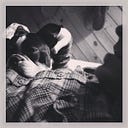On Thursday, February 2, 2023 I was honored to receive the Creighton University College of Arts & Sciences Dean’s Award for Excellence in Tenure Track Teaching. Each year the recipient of this award is asked to offer a short refection on teaching at the ceremony. I thought I would share my remarks below. I again thank those who nominated me including the students who endorsed my nomination.
Given the excellence of previous recipients, this is overwhelming. In Communication Studies, I teach courses on Surveillance Culture, Rhetoric, Gender Communication, and Communication and Community (all of these are part of the core by the way). In each of these, my purpose is to help students connect class content with issues, problems, and tensions they face in their everyday life. I promise to keep this short, as I know food and drink are calling us, but I want to dwell a bit on the question: What is teaching?
Community
Teaching is community. Teaching is not a solo activity, a burst of individual genius, or a proprietary enterprise full of carefully guarded trade secrets. Teaching is a radical act of community — Community with students, with colleagues, with student life, with our discipline (and others), and with the larger world. My work in the classroom is impossible without a cadre of friends, colleagues, and mentors who have carried me along the way: Jody Roy and Steve Martin at Ripon College, Kari Anderson at Colorado State, Len Hawes at Utah. Not to mention those here at Creighton — my department who always makes space and time to talk about teaching, My chairs Chad McBride and Sam Senda-Cook who offer feedback and ideas to help me improve, Adam Sundberg who I have team taught with, and the trio of Faith Kurtyka, Lydia Cooper, and Matt Reznichek who are only a text away when I need advice. Nora, who is only three but already has provided endless anecdotes to use in the classrom. And of course, Amanda McHendry who always reminds me to think about where my students are coming from. She loves me unconditionally, she supports me in ways beyond measure, and isn’t afraid to bluntly tell me when I have a bad idea.
Tinkering
Teaching is tinkering. I am also a constant tinkerer — I am never satisfied with how a class went and even after a great semester I toy with the idea of throwing the syllabus out and starting over again. This was an impulse Chad McBride would make me promise to control during our annual reviews. We tinker because knowledge changes, the world changes, and based on the photo on my Creighton ID, we apparently change too. We tinker because teaching is an uncertain exercise where the outcome is possible but never guaranteed. We tinker because we want better for our students.
Communication
Teaching is communication. The earliest strands of the field of communication studies can be found in classroom debates over rhetoric. Plato, Aristotle, and the Sophists — teachers and students discussing the value of the practice of communication. To riff on my friend Chad McBride, teaching requires communication and communication requires teaching. Communication is not some innate activity that requires no real thought. Our verbal and non- verbal communication can inspire and demoralize our students — or in the words of a student I taught at Utah, “You can silence me with a look but you can also encourage me to speak.” Wherever you find good teaching, good communication is present.
Listening
Teaching is listening. My mentor Len Hawes is fond of saying, listening is an ethical choice we make. We need to listen to our students, our colleagues, and probably even the Dean’s office from time to time. A classroom that embraces listening can tune into where we are and where our students are. I am not just talking about questions a student may have about content. We need to listen to the students who are struggling with their identity:
-The student who is in crisis because their pre-med pathway isn’t working out.
-The student who is having a hard time affording food (let alone tuition)
-The trans student who loves this campus even while it refuses to formally acknowledge their identity or make space for them.
These students need us to listen to them, because they are telling us that the content of our classes is not the only challenge they face.
Mission
Teaching is a mission. Before coming to Creighton, I thought good teaching meant delivering content effectively with the understanding that knowledge can transform students. I remember being told that Creighton demands more. I was warned to expect lower evals than I was used to because just as we have high expectations for our students, they have them for us. Obviously, teaching includes being effective at passing on knowledge. Creighton helped me find a greater mission in teaching. I know we love our charisms, but honestly the expectation of cura personalis and the direction to form students as women and men for and with others gave me a much wider lens of the work we can do. Creighton helped me to see teaching as not just a practice, but an act of care for who our students are and who they will become.
Human
I will close with this, teaching is human. Teaching brings out the best of our humanity and I could not ask for better than to spend my life working with all of you in a truly human endeavor that serves a higher purpose or calling. Thank you all for being here today. I want to extend my congratulations to all the other award recipients — I hope you have time to revel in your accomplishments. Thank you.
